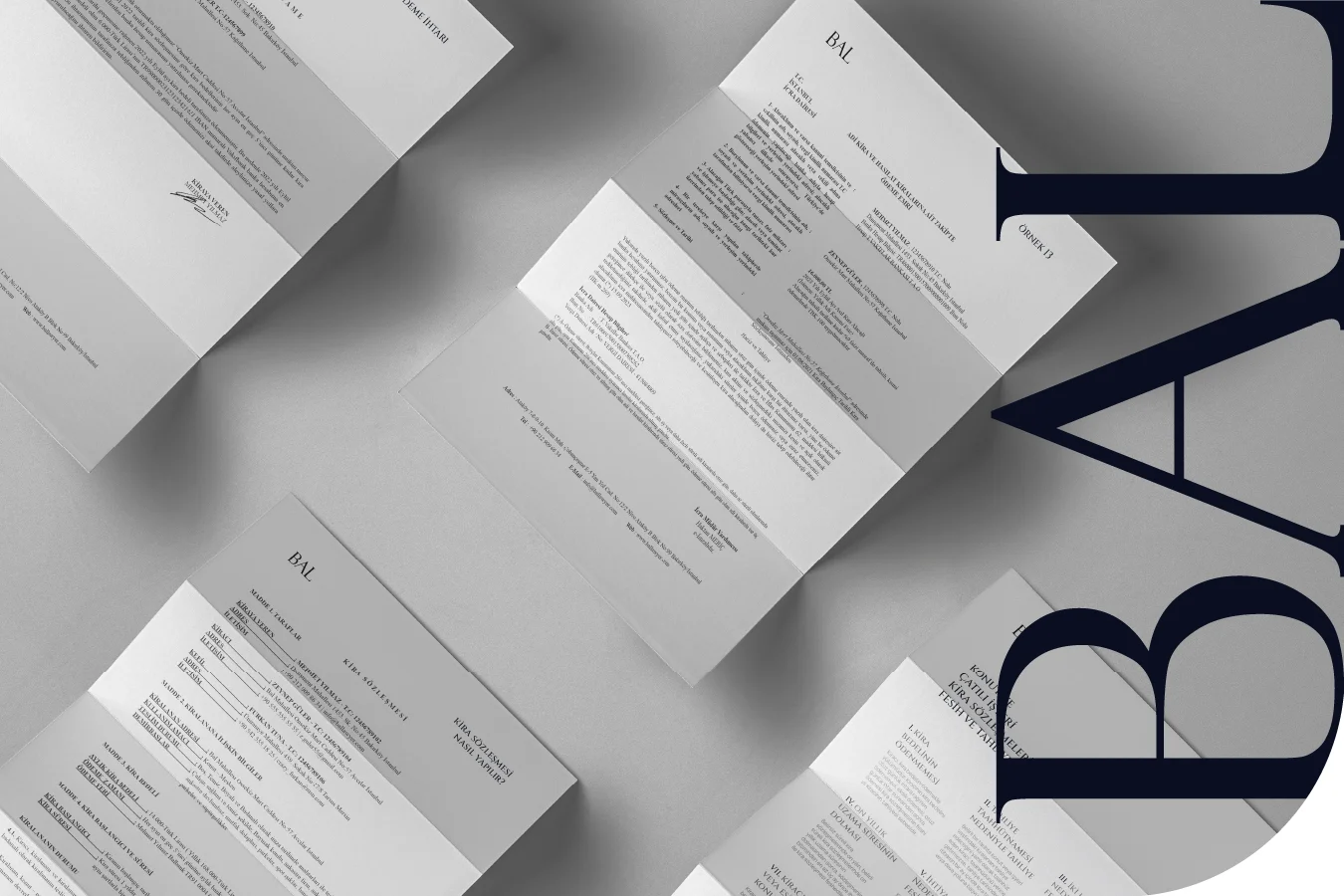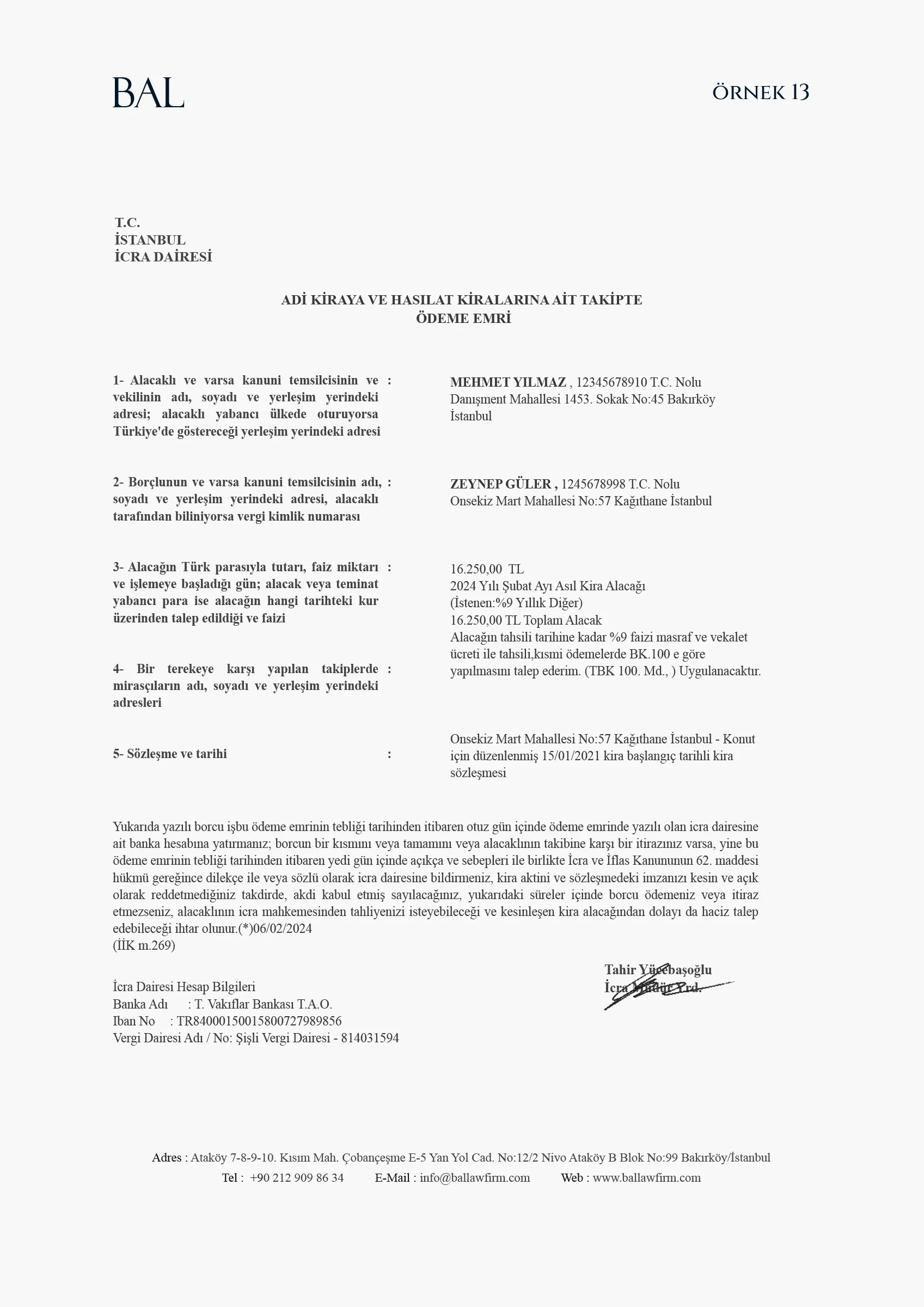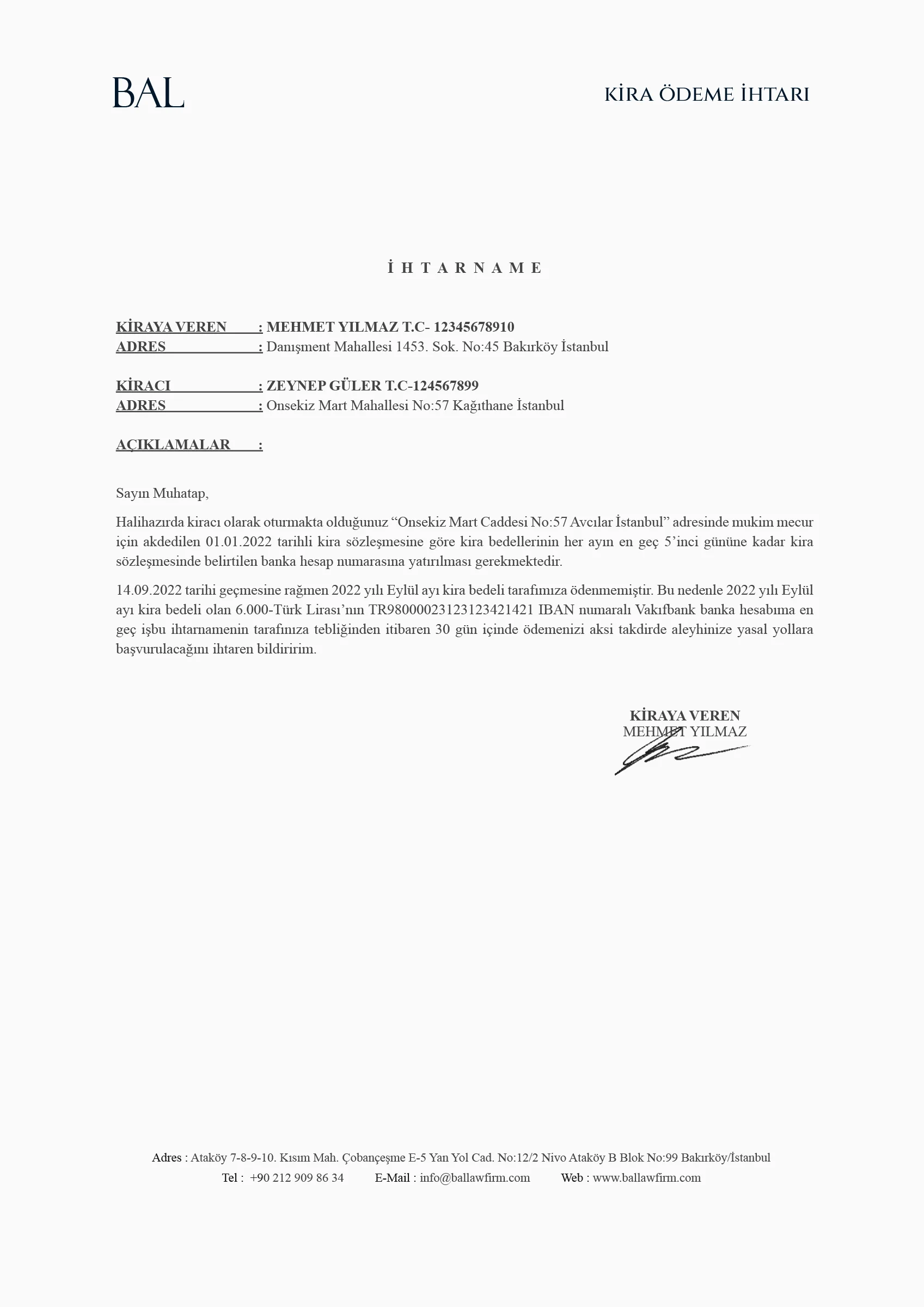
I. In General
The tenant is obliged to pay the rent debt. At the same time, this debt must be realized in the manner and on time specified in the contract. It is possible to evict a tenant who does not pay rent despite the 30-day notice period. Unpaid rent may also be collected from the tenant.
There are two things to do for a tenant who does not pay rent. The first is the eviction of the tenant who does not pay rent, and the second is the collection of unpaid rent.
II. Eviction of Tenants Who Do Not Pay Rent
There are two options for evicting a tenant who does not pay rent. The first of these; It is to initiate enforcement proceedings with a request for eviction for the evacuation of the rented property. The second is to send a written warning to the tenant and give 30 days. Then, applying for mediation and filing an eviction case in the civil court of peace.
1. Eviction Process through Enforcement
It is possible to initiate enforcement proceedings with a request for eviction against a tenant who does not pay his rent debt. In the follow-up request, the necessary information will be filled in and given to the enforcement office. The enforcement office issues payment orders for ordinary rents and revenue rents. This payment order is notified to the tenant via mail. The payment order states that the tenant has the right to object within 7 days. Otherwise, he/she is warned to pay the rent debt within 30 days, otherwise an eviction lawsuit may be filed against him/her.
If the tenant objects within 7 days from the notification of the payment order, but does not pay the rent debt at all or in full, the lessor will have the right to remove the objection and file an eviction lawsuit. Even if the tenant objects, the 30-day period must expire. On request; The unfair tenant who objects to the enforcement payment order will have to pay twenty percent enforcement denial compensation in addition to the rent.
The ability to file a lawsuit in the enforcement civil court depends on the tenant not denying his signature on the written lease agreement. If the tenant denies the lease relationship or signature, then a lawsuit must be filed in the civil court of peace.
If the tenant does not object to the payment order and does not pay within 30 days, it is possible to file an eviction lawsuit in the enforcement civil court. As a rule, the enforcement civil court conducts a formal review. The tenant can only avoid eviction if he proves that he has made payment within 30 days. Otherwise, the court will not review other objections.
In addition to evicting the tenant who does not pay rent through enforcement, it will also be possible to collect the unpaid rent. Therefore, there will be no need to initiate a separate enforcement proceeding for the unpaid rent debt.

2. Eviction Case in the Civil Court of Peace
The second way for a tenant who does not pay rent is to initiate the process by sending a written warning to the tenant. If the tenant has not paid even though the rent debt is due, the tenant is warned to pay the rent debt within 30 days. Sending the warning through a notary provides ease of proof. In addition, notification sent through a notary will be easy.
If the tenant does not pay the rent within 30 days despite the warning, an eviction lawsuit cannot be filed directly. First of all, mediation should be used to resolve the rental dispute. If an agreement cannot be reached in mediation, termination of the contract due to default, payment of unpaid rent and eviction of the rented property will be requested. This case will be filed in the civil court of peace.
Sample Warning Letter to Tenant Who Doesn’t Pay Rent

III. Collection of Rental Debt in Turkey
Apart from the eviction of the tenant, the collection of unpaid rent debt will also be requested. While enforcement proceedings can be carried out regarding ordinary rents and revenue rents due to unpaid rent debt, it is also possible to pursue proceedings without a judgment through direct general seizure.
Despite the finalization of the enforcement proceedings, if the tenant does not pay his debt, the assets may be seized and subsequently sold. Assets that can be seized can be counted as money in the bank, deposits, motor vehicles, real estate, salary and wage seizure.
If the tenant does not have assets that can be seized, it is not possible to collect the debt, even through enforcement. However, the tenant will have to pay the unpaid rent debt together with expenses, fees, attorney fees and interest.
1. Statute of Limitations for Rent Debt
The statute of limitations for rental receivables is 5 years. The lessor must claim the rent receivable from the tenant within a period of five years at the latest. Th statute of limitations will be invoked as a defense (objection). Otherwise, the judge will not take it into consideration ex officio.
Requesting the rent debt through a warning, enforcement proceeding or lawsuit interrupts the statute of limitations period. The limitation period will start to run again from the date of request.
2. How Long Can the Tenant Delay the Rent?
It will be necessary to look at the lease agreement to answer the question of how long the tenant can delay the rent. If the rental agreement states when the rent will be paid, then the rent must be paid on the specified date at the latest. If the rent payment falls on a weekend, the first business day will be added to the payment period.
In verbal leases and in cases where there is no provision in the lease agreement regarding when the rent will be paid; It is possible for the tenant to pay rent until the last day of the current month.
In case of residential and roofed workplace rent debt, the tenant must be given at least 30 days for payment in accordance with Article 315 of the Turkish Code of Obligations. Otherwise, there will be a violation of the law and the tenant will not be in default. For this reason, the eviction of the tenant cannot be requested.
3. Applying Interest on Rental Debt
Interest may be requested for all kinds of debts starting from the date of default. This interest rate is the ordinary legal rate and is applied as 24 percent annually. (Law No. 3095)
However, it can be decided in the lease agreement that the default interest will be paid more than 24% annually. In such a case, the interest rate to be applied to the rental debt will be valid up to 48% annually in accordance with Article 120 of the Turkish Code of Obligations.
4. Instead of Conclusion
For a tenant who does not pay rent, it is logical to initiate enforcement proceedings with a request for eviction in order to collect the unpaid rent and evict the tenant. In this way, the process can be progressed as quickly as possible and with the least expense. After sending a notice from the notary, a lawsuit for receivables, termination and eviction in the civil court of peace may be advantageous, depending on the location.
A common recommendation from lawyers in the field of rental law is to start the process early. So that; Delay in the processes initiated against the tenant who does not pay rent is always to the detriment of the lessor.
Memduh Remzi BAL
Attorney at Law | Lawyer in Turkey
Landlord Tenant Attorney Services
Call us : +90 212 909 86 34
Send mail : info@ballawfirm.com
